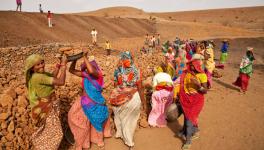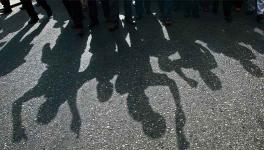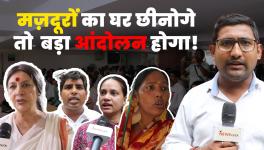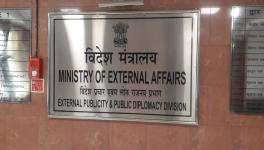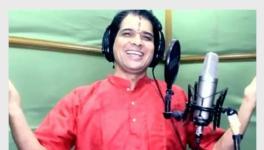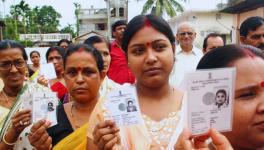TN: Urban Local Body Polls Announced, Need to Focus on Decentralisation
Image: R Prakash
The state election commission (SEC) on January 26 announced the poll schedule for the urban local bodies (ULB) in Tamil Nadu. The announcement was made after the Madras High Court refused to defer the elections, considering the third wave of the COVID-19 pandemic.
The filing of nominations will begin from January 28, while the polling will take place in a single phase on February 19 to the 21 municipal corporations, 138 municipalities and 490 town panchayats. The indirect elections to the posts of mayors, deputy mayors, chairpersons and deputy chairpersons of the ULBs will take place on March 4.
Despite being the basic structure of the democracy, the local bodies are devoid of much power to execute projects and schemes required at the grassroots level. The 73rd and 74th amendments to the constitution have not ensured enough powers to the local bodies, while the introduction of technology-based projects have led to the choking of whatever existing liberties they had.
SINGLE-PHASE ELECTIONS
The elections to the ULBs were due in December 2016 and were postponed citing several reasons by the then regime led by the Anna Dravida Munnetra Kazhagam (AIADMK). The Dravida Munnetra Kazhagam (DMK) sought legal intervention, and the Supreme Court ordered the SEC to announce the elections before January 27, 2022, in an order dated September 27, 2021.
The elections to the 12,838 wards of the 649 ULBs will be held in a single phase, and the electronic voting machines will be used. After shifting between direct and indirect elections for the posts of mayors and chairpersons of the ULBs, the government has stuck to its recent decision to hold indirect elections to the 1,898 posts, to be held on March 4.
The alliances led by the DMK and the AIADMK are keen on the polls as talks of seat-sharing continue between the parties in the two major alliances. The actor Kamal Haasan led Makkal Neethi Maiam (MNM) and Tamil nationalistic outfit Naam Tamilar Katchi (NTK) are going alone and are expected to contest from most seats.
During the AIADMK regime, the DMK opposed indirect elections to these posts but decided to stick to the indirect mode of elections. The AIADMK and DMK government had toggled between the direct and indirect mode of elections for the posts of mayors, deputy mayors, chairpersons and vice-chairpersons since 1996.
Despite being fought keenly, both the major parties have tweaked the rules in their favour and have spoken less on more powers to the local bodies to cater to the basic requirements at the grassroots level.
'DECENTRALISE LOCAL BODIES'
The local bodies were empowered through the 73rd and 74th amendments in 1992. The amendments were made to establish democratic, decentralised administration through local bodies and take the administration to the people's doorsteps to ensure economic and social justice.
The primary duties include town planning, economic and social development, water supply, conservancy works, public health and ensuring the services rendered by the government reaches the citizens.
MG Devasahayam, a former IAS officer, opined that the amendments have not achieved the intended targets.
"The third tier of the democracy was not incorporated in the constitution, which is a major flaw in a populous and diversified country. The governments take the local bodies for granted and act as they please. They are converted into mere grant receiving bodies," he said.
Commenting on the status of the local bodies in Tamil Nadu, Devasahayam said, "The state had a very robust panchayat raj system before and after independence, till the introduction of the constitution. Dr BR Ambedkar thought that the casteist elements would capture the local bodies and oppress others, hence incorporating clauses on state and central legislatures."
'JNNURM AND AMRUT DILUTED POWERS'
With continuous demands for reforms, the Jawaharlal Nehru Urban Renewal Mission (JNNURM) was implemented in 2005 by the United Progressive Alliance (UPA) government.
"The idea of reforming the panchayat raj was mooted in 1988 during Rajiv Gandhi's tenure as the prime minister, followed by the 73rd and 74th amendments in 1992. The ambitious JNNURM, implemented during the first UPA regime, was the first step," Devasahayam said.
But, the JNNURM was opposed as being a step to centralise the local bodies and implement neoliberal policies.
The JNNURM was replaced by the Atal Mission for Rejuvenation and Urban Transformation (AMRUT). The introduction of smart cities has further diluted the powers of the ULBs.
"After Narendra Modi became the prime minister, the JNNURM has been diluted, and the corporate-friendly, technology-oriented smart city projects are implemented. It has not spoken about democracy in local bodies, which is the primary need. They simply receive grants from state and central governments," Devasahayam said.
Experts have continuously opined that the smart city projects implemented are more of a cosmetic intervention and ill-planned, causing hardships to the people.
"The local bodies need to be empowered and decentralised. The functioning of the local bodies have become a ritual, and the election process is corrupt now. For grassroots democracy with the participation of the people, we need reforms and not centralisation as it is happening now," Devasahayam said.
Get the latest reports & analysis with people's perspective on Protests, movements & deep analytical videos, discussions of the current affairs in your Telegram app. Subscribe to NewsClick's Telegram channel & get Real-Time updates on stories, as they get published on our website.









